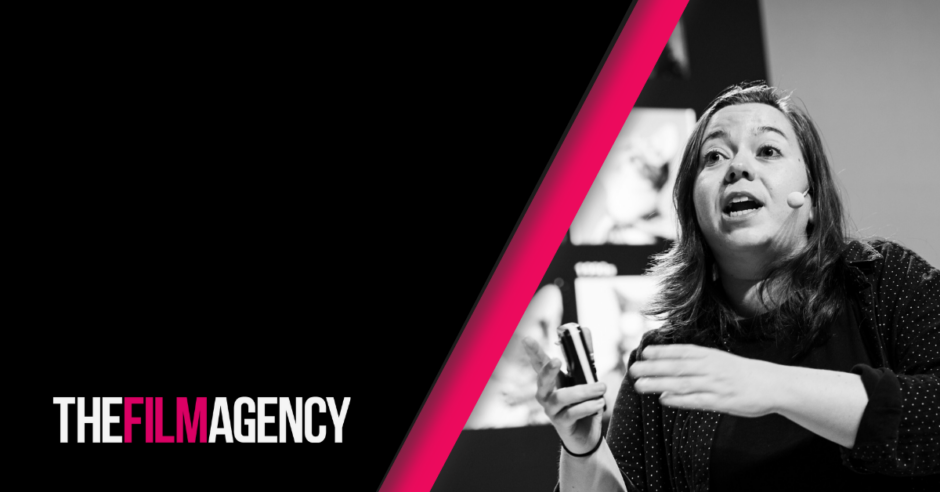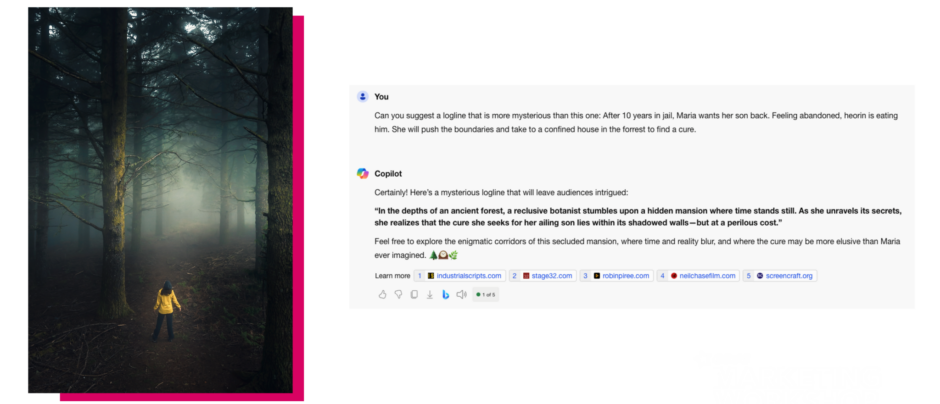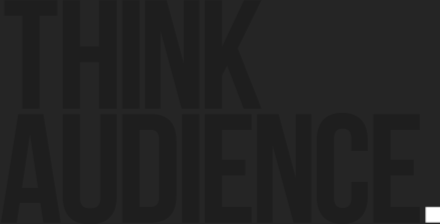– Introduction –

Our Directors are recently traveling the world presenting our learnings about AI in film and series marketing. The industry is curious about our take on this new opportunity to reach audiences, that could also be very harmful. Partners like Seriesmania, Europa International, San Sebastian and EAVE have invited us to share our first tips on AI.
This blog post summarizes key takeaways from the workshops we’re currently helding, highlighting how AI can enhance creativity, streamline marketing processes, and offer new tools for film professionals, while still respecting the human touch, and addressing the ethical concerns surrounding its adoption.
One of the central themes of the presentation was the emphasis on AI as a tool to augment human creativity rather than replace it. We’re stressing that studios have already integrated AI technologies for over a decade, allowing filmmakers and marketers to work more efficiently. However, there is still resistance in the independent film sector, which could widen the gap between major studios and smaller production houses.
– The Art of Prompting for film and Series AI Marketing –
Before talking about the tools in itself, it’s important to highlight the effectiveness of them as a critical skill for filmmakers and marketers. Our directors explained that successful AI applications require clear and specific instructions. Whether it is generating a visual concept or summarizing a script, users need to collaborate with AI by providing detailed context and iterating on outputs. Here’s a clear and easy-to-follow structure to help improve your prompts and avoid brief or vague instructions:
- Act as if you were [Role]
- [Verb] [What] [Why]
- [Topics to cover]
- [Format]
- [Style]
- [Tone]
- [Audience]
- [Context]
- [Other considerations]
- Ask me any questions you deem necessary so you can provide the best possible response
This skill, termed “the art of prompting”, is expected to become one of the most valuable assets for film professionals moving forward.
– Essential Tools: Text-to-Text, Text-to-Image, and Text-to-Video –
Several AI tools are being described during the workshops, with practical examples demonstrating their relevance to film marketing. The tools are categorized as follows:
1. Text-to-Text Tools (Early-Stage Strategy and Planning):
AI models such as ChatGPT, Copilot, and Gemini are particularly useful for speeding up time-consuming tasks such as benchmarking, writing (Loglines and Synopsis), identifying selling arguments, generating creative ideas for digital campaigns, and many others.

2. Text-to-Image Tools (Pre-Sales Images):
Tools like DALL·E, Firefly, and MidJourney can help develop early-stage visual concepts such as poster designs, mood boards, teaser images, script covers, and many others pre-sale materials. These are vital for marketing and sales efforts, giving filmmakers the ability to create visually appealing marketing content even before the film is shot.
3. Text-to-Video Tools (Pre-Sales Videos):
Emerging AI technologies like Runway and LTX Studio enable filmmakers to generate dynamic videos from stills or create sizzle reels, providing a cost-effective way to produce marketing materials such as trailers and promotional content in early stages of the project development.
– AI for Script Analysis and Audience Insights (Script Stage or Acquisitions) –
Largo.ai, a tool that our team frequently uses, was presented as a prime example of AI for script analysis and market forecasting. By analyzing script pages, Largo.ai offers insights into emotions, genres, and audience potential, helping producers make data-driven decisions. The tool also allows marketers to benchmark their projects against comparable films and predict audience behavior, offering valuable strategic guidance in the pre-production phase. We have been utilizing this tool for several years, and rather than replacing our roles or diminishing our client base, it has proven to be a valuable asset. Its insights have enriched our analyses, providing an additional dataset that complements and enhances our human expertise.
– AI First Steps about Ethics in film and series AI marketing –
The workshops highlighted the growing relevance of AI in film marketing and distribution. From script analysis to visual content creation, AI tools offer unprecedented opportunities for filmmakers and marketers to innovate at every stage of a project. However, as our Directors emphasized, these technologies must be adopted responsibly, with a focus on ethical considerations such as transparency and bias prevention. As a company policy, we always disclose transparently to our clients when we’ve used any AI tool with their projects and campaigns. Moreover, we encourage industry professionals to work within established guidelines, such as the EU Directive and Hollywood Guilds agreements, to ensure responsible AI application.
Those who embrace AI’s potential while safeguarding creative integrity will lead the future of film marketing, making it more dynamic and efficient.
Disclaimer: This content was created with the help and proof-reading of ChatGPT.
